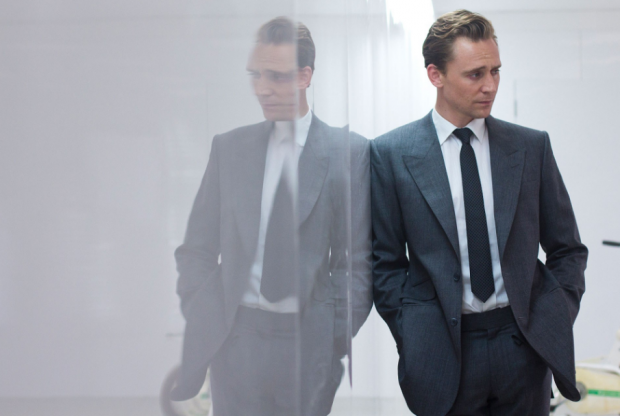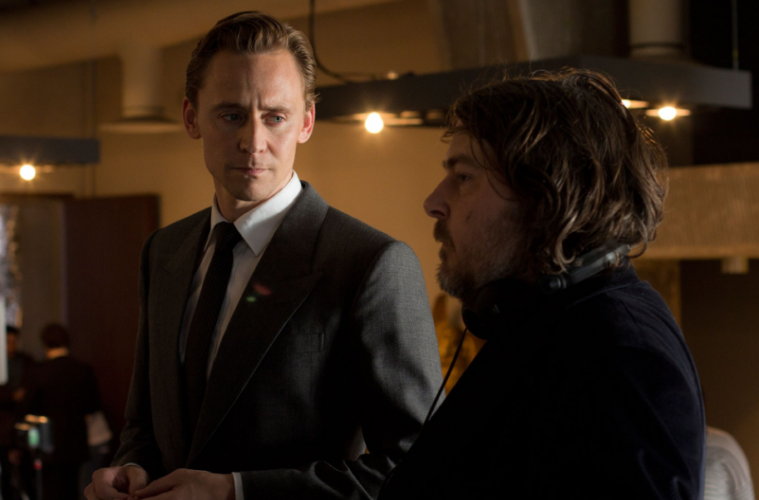
It’s no exaggeration to say that after Ben Wheatley’s exhilarating High-Rise made its long-awaited debut at the 2015 Toronto International Film Festival, audiences staggered out of the theater in a daze. While some may have found the experience overwhelming, just as many emerged with a feeling of real exhilaration. Yes, Wheatley’s adaptation of J.G. Ballard’s 1975 novel is that kind of film. This story of life becoming unhinged in an imposing, endlessly fascinating tower block is violent, oozing with sex and littered with chaos. And while clearly not for all tastes, it’s almost impossible not to be impressed with Wheatley’s filmmaking prowess.
With a starry-cast — a never-better Tom Hiddleston, Jeremy Irons, Sienna Miller, Luke Evans, Elisabeth Moss — music from Clint Mansell and Portishead (the band contributes a stunning cover of Abba’s “S.O.S.”), High-Rise is the latest uncompromising visual and sonic explosion from Wheatley. The English director’s Down Terrace, Kill List, Sightseers, and A Field in England have earned him a dedicated following. He is also known for his television work, including two episodes from the eighth season of Doctor Who.
Like his other big-screen efforts, High-Rise was written by and co-edited with his partner, Amy Jump. While promoting the film in Vancouver, Wheatley discussed how he and Jump approached Ballard’s text, why the transition from his earlier features to the world of High-Rise was not as massive a leap as it might seem, and also provided an update on his next film, the Boston-set crime drama Free Fire. Recently picked up by A24, Free Fire is executive produced by Martin Scorsese and stars recent Room Oscar winner Brie Larson, Sharlto Copley, Armie Hammer, Cillian Murphy, and Jack Reynor. In the meantime, the sensual menace of High-Rise is finally coming to theaters this Friday after a VOD release.
The Film Stage: High-Rise has always been categorized as an “unfilmable” book. Did that label have any impact on your approach to the film?
Ben Wheatley: It just depends how you define unfilmable. There are books that are structurally and formally difficult; something like Naked Lunch is formally difficult because it jumps all over the place. I don’t think that was ever the issue with High-Rise. When you actually look at the book, it has quite a linear storyline to it, and it’s quite strong visually. The difficulty comes in the way the characters act. It doesn’t have a traditional happy ending, and the characters don’t act like traditional Hollywood movie characters do. But I think High-Rise has unfairly had this unfilmable tag just because it’s been in development for a long time. It doesn’t necessarily always mean the same thing. With High-Rise, it just means there’s not been an appetite for it up until now, not that it’s been impossible to film.
You’ve said part of what you found appealing about Ballard as a young reader was that his work felt dangerous. Was that part of the appeal in bringing High-Rise to life — tackling something that inspired those feelings?
Yes, but when I was a kid and I read High-Rise, it was basically predictive fiction. Unfortunately, now it’s kind of come true. We’ve come to meet Ballard’s predictions rather than [see them] become less relevant. They’re actually more relevant over time. And the idea of being kind of Ballard-ian characters trapped in this modern world seems to feel more like documentary than like fantasy.

Do you think the story’s parallels to the present day were always there? Was that another element of your attraction to adapting High-Rise?
Yes, I think so. That’s just part of what happens when you are engaged in writing predictive fiction — your story is always [looking] into the future a little bit, so it’s got stronger legs than most novels might have. Ballard’s peers were writing about their experiences of being professors at universities and their love affairs or whatever, but those books date a lot faster than something that’s already looking to the future.
I think the main attraction for me to Ballard and for readers to Ballard is that he could look at the modern world and dissect it, and he had a very unique vision of what the modern world was. He saw beyond the bubble of reality that we exist in, the thing that makes everything seem to make sense in the modern world. I think maybe his own experiences of being a child — where he saw the world he was living in completely destroyed and reassembled again — gave him an insight into the way that the world works. [You don’t have that insight] without having that violent wrench from one reality to another reality. The modern person just feels that what’s happening to them at this moment is something that’s immutable. This is a problem with the western world, that most people don’t even think they’re going to die, let alone can see beyond their own immediate moment.
In terms of mounting the film, what was it like to make the transition from your earlier films to something with the size and scale of High-Rise?
I think if you look at the films I’ve made and you go from Sightseers to High-Rise, it looks like a massive leap. But the reality is that during that time I also made a lot of television and directed lots of adverts. In my films, we never had enough budget to even move the camera — everything had to be handheld because of budget restraints. I love handheld camera, but this is the first time I’ve had the opportunity to have a large set built and even to have extras, really. I feel like I’ve been working with a full deck of cards for the first time. Not that I mean there is anything wrong with the other films, but they were very specifically designed to be done for the budgets that we had.

Talk a little about the editing style? There are moments when you jump to different parts of the buildings in the same sequence, and sometimes even mid-sentence. How much of this was pre-planned, and how much was developed in post-production?
Amy tends to write the scripts with the editing in, and because she is the editor with me, she knows that she can have that control. Accepted wisdom is that the script should be as vanilla as possible going forward to the director, but because I’m going to direct it and she’s going to edit it with me, we know that anything that’s written in the script at the beginning can be executed at the end, and not in a way that will irritate the people making the movie. There’s this idea that screenwriters should know their place, and not interfere with the work the director does. But because those jobs are so blurred between our different roles, it’s absolutely fine. So quite a lot of the structure of the film was already in place before we started shooting. Obviously, some of the montage stuff was created on the fly as we made the movie. On High-Rise and on [upcoming film] Free-Fire, and even on A Field in England, we edited as we went along. That means I can [identify] shots I need as I’m in production that I can fire off to the second unit to go and get to make those sequences work.
In order to finance a film as bold and ambitious as High-Rise, was it essential to have a cast of established names?
Totally. It’s important in getting any film made, but at a certain budget level, you just don’t financing unless you’re swimming in that pool. And that’s the way it’s always been. But then the other side of it is that people don’t rise up to become those names unless they’re really, really brilliant as well. So it’s absolutely fine.
Your next film, Free Fire, is another large-scale production. Can we expect to see it make the fall festival circuit? And how fun was it to see your star Brie Larson’s success?
It’s finished, so I think it’s looking at a release in September. We’re really looking forward to unleashing it. [As for Brie Larson], we were filming well before Room was nominated; none of it had happened really. All that was happening at the time was that Room was being talked about as being really good. But it’s been an incredible ride for her. It’s quite something, really.

High-Rise is now on VOD and hits theaters on Friday, May 13th. See the first look at Free Fire above via Empire.

